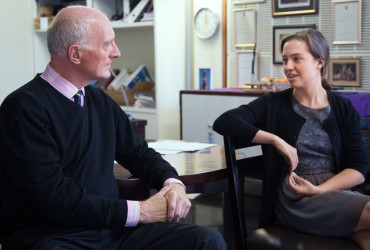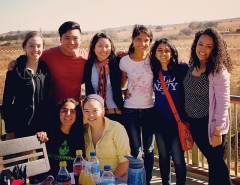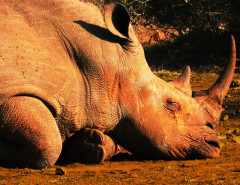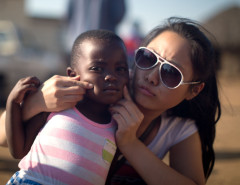Today was a big day. In usual jetlag fashion, I woke up a good hour before everyone else (only! This is an improvement!) and was the first person at breakfast. At 8.15am, we left (a little tardily) for the Lion and Rhino Park. There, I experienced my first “authentic” African experience (ironically defined by tourists/foreigners), spotting cheetahs (pun intended), rhinos, wildebeests, white and brown lions and my favourite, warthogs. But, hands down, the highlight of my day was patting the baby (or rather, teenage?) lions. They weren’t particularly soft, but there was something very exciting and fulfilling about the very idea of petting a lion.
There was also something ethically troubling about the caged (literally) life of these majestic animals, some students empathetically imagining life being caged like that. It seemed unnatural trying to domesticate these wild creatures. However, I am wary of my gut instinct to moralize, noting that morality is a social construct and falls into the secondary category of ‘natural’ by becoming ‘naturalized’ (through social institutions such as culture that expand upon more basic human impulses, which fall into the primary category of natural). If the pain we imagine when empathizing with animals is a result of humanization of animals, which so much distorts our ability to accurately empathize, to what extent can or should we harness this empathy (arguably the essence of being human) to argue for ‘animal rights’? Furthermore, since all rights come with responsibilities, what are animal responsibilities?
We ended our visit with a late lunch consisting of double-sized portions of pizzas, sandwiches and “food babies.”
Shortly after returning to the country manor, we engaged in a crash course on Photoshop where we learned how to manipulate the hue and saturation of photos as well as to follow the ‘rule of thirds’. In preparation for and until dinner with Tata, a survivor of XDR-TB, we learned about the differing diagnosis, transmission and treatment of HIV/AIDS and Tuberculosis.
Tata’s story highlighted the importance of emotional support from friends and family, the extent of the stigma attached to TB and the misconceptions surrounding TB (that it only affects poor men or is the same as HIV). She stressed the importance of education as a preventative method of combatting the spread of TB, often in simple ways (open the windows!). Education is also a way of reducing TB’s overall severity, much of which is derived from social stigma (which in turn is shaped by education or lack of it). What you know (or don’t know) about a disease defines how you perceive it, and even my basic knowledge of TB from the short lecture that day was enough to disarm some of these common misconceptions. These misconceptions embody such social force that I sometimes wonder what matters more: the truth or perception of the truth? Can you ever really have one without the other ie. is there an objective truth? (You can see I’m a true post-modernist.)
Nevertheless, my point is that the effects of TB (or any disease) exceed the medical sphere of “symptoms”, calling for a strong support network to emotionally get through harsh and lengthy treatment. I tend to underestimate the importance of emotional support, seeing it as (helplessly) independent from one’s chances of survival when one is bedridden, but I suppose this is reductive given that just like the most important things in life, the link between body and mind cannot be defined but most certainly exists.
Mass education and dissolution of the ‘Other’ (marked by XDR-TB) are necessary for the reorienting of social perception, enabling of empathy and improved social treatment of TB. Such education must cater not just for large numbers, but also for a large spread of social and socio-economic groups, both of which social media is well-poised to address. Thus, seeing how education and empathy are so important in the management of global health from a moral and practical standpoint has consolidated my belief in the importance of Visual Approaches to Global Health.






Leave a Reply